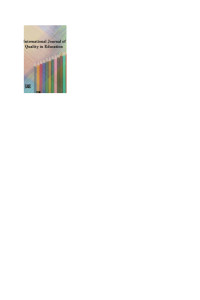Abstract
As the pace of technological developments increases, it has become necessary for individuals to be in continuous learning in order to catch up with the developing information and technologies. In order to meet these needs, individuals need lifelong learning. There are studies supporting lifelong learning in the world and in Turkey. The importance of lifelong learning in Turkey has been understood more after the 2000s. Lifelong learning activities are carried out under the umbrella of the General Directorate of Lifelong Learning, which was established by the Ministry of National Education. Lifelong learning, the value of which is understood in Turkey and the necessary studies are carried out for its development, is a comprehensive education field in which the individual learns from birth to death, including adult education.
The purpose of this research, It is the examination and evaluation of postgraduate theses written on lifelong learning in Turkey and articles published in Dergipark, the national academic journal platform, by using content analysis method. As a result of this research, instead of reaching information about the contents of theses and articles related to lifelong learning one by one, It is aimed to provide a general evaluation of all theses and articles. In the research, content analysis of 189 theses available in the National Thesis Center of the Higher Education Institution and 175 articles available in Dergipark was carried out. Scanning model was used in the research. In the content analysis, the documents were examined and answers were sought in 9 sub-titles in the analysis of the data. When the publication years of theses and articles are examined, it is seen that there has been an increase in the studies done in the last five years. It is seen that the master's theses written on lifelong learning are more than doctoral theses, and the number of theses made in Turkish language is higher than the theses made in foreign languages. When the theses were examined, it was determined that the university with the most studies was Bartın University. When the research method tendencies of the theses and articles are examined, it is seen that the quantitative method is more common than the other method types, and the scale type data collection tool is more common than other data collection tools. It has been seen that the most used keyword is "lifelong learning". While the number of article authors is seen to be up to 6, the rate of articles with 2 authors is higher than the others. It is thought that when the number of theses and articles is increased, it will have an impact on the subject of lifelong learning to take place more in the agenda of Turkey. It has been observed that the number of qualitative and mixed studies is low and it is recommended to increase the number of these studies.
References
- Adams, D. N. (2007). Lifelong Learning Skills And Attributes: The Perceptions Of Australian Secondary School Teachers. Issues in Educational Research, 17, 1-12.
- Berelson, B. (1952). Content Analysis İn Communication Research. New York: Hafner Press.
- Bhowmick, T. (2021). Culture And Education For Lifelong Learning. Journal homepage: www. ijrpr. com ISSN, 2582, 7421.
- Büyüköztürk, Ş. (2009). Sosyal bilimler için Veri Analizi El Kitabı: İstatistik, Araştırma Deseni, SPSS Uygulamaları ve Yorum (9.baskı). Ankara, Pegem Yayınları.
- Cornford, I. R. (2002). Learning To Learn Strategies As A Basis For Effective Lifelong Learning. International Journal of Lifelong Education, 21 (4), 357-368
- Erdoğan, İ. (2004). Yaşam Boyu Öğrenme ve Medya: Mitler ve Gerçekler. Ankara Üniversitesi Eğitim Bilimleri Enstitüsü Yaşam Boyu Öğrenme Sempozyumu. http://www.irfanerdogan.com/egitim/lifelongspeech.htm (Erişim Tarihi: 24 Haziran 2021).
- Eurydice, (2000). Apprendre Tout au Long de la Vie: la Contribution des Systèmes Educatifs des États Membres de l’Union européenne, Lisbonne
- Güleç, İ, Çelik, S. and Demirhan, B. (2013). Yaşam Boyu Öğrenme Nedir? Kavram ve Kapsamı Üzerine Bir Değerlendirme. Sakarya University Journal of Education, 2 (3), 34-48.
- Günüç, S, Odabaşı, H. and Kuzu, A. (2012). Factors Affecting Lifelong Learning. Gaziantep University Journal of Social Sciences, 11 (2), 309-325. Retrieved from https://dergipark.org.tr/tr/pub/jss/issue/24239/256961
- Konakman, G. and Yelken, T. (2014). Eğitim Fakültesi Öğretim Elemanlarının Yaşam Boyu Öğrenme Yeterliklerine İlişkin Algıları. Hacettepe Üniversitesi Eğitim Fakültesi Dergisi, 29 (29-2), 267-281.
- Lambeir, B. (2005). ‘’Education as Liberation: The Politics and Techniques of Lifelong Learning.’’ Educational Philosophy and Theory, 37 (3):349-355.
- MEB, (2018). T.C. Milli Eğitim Müdürlüğü, Hayat Boyu Öğrenme Genel Müdürlüğü. Hayat Boyu Öğrenme Kurumları Yönetmeliği. https://hbogm.meb.gov.tr/www/hayat-boyu-ogrenme-kurumlari-yonetmeligi/icerik/791 (erişim tarihi: 14.05.2021)
- Titmus, Colin. J. (1999). “Concepts And Practices of Education And Adult Education: Obstacles To Lifelong Education And Lifelong Learning?”. International Journal of Lifelong Education 18 (5): 343-354.
- Torres, R.M. (2001).Lifelong Learning in the North, Education for All in the South, International Conference on Lifelong Learning, Beijing. Web:www.unesco.org/education/uie/news/beijing.shtmladresinden 24.5.2007 tarihinde alınmıştır.
- Yıldırım, A. and Şimşek, H. (2011). Sosyal Bilimlerde Nitel Araştırma Yöntemleri (8.baskı). Ankara: Seçkin Yayınları
Details
| Primary Language | English |
|---|---|
| Subjects | Studies on Education |
| Journal Section | Articles |
| Authors | |
| Publication Date | December 7, 2022 |
| Submission Date | March 3, 2022 |
| Published in Issue | Year 2023 Volume: 7 Issue: 1 |


